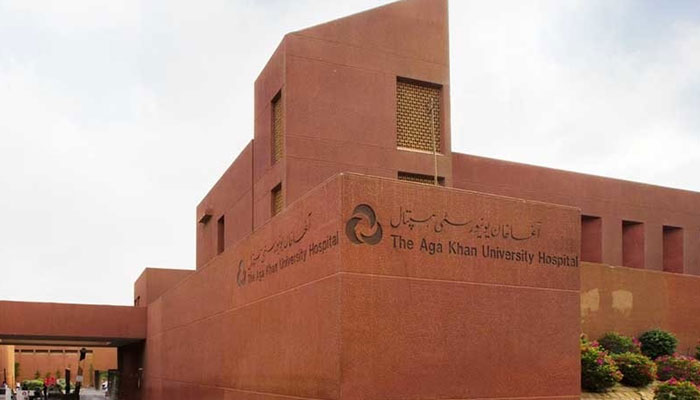All efforts aimed at slowing down coronavirus spread in Pakistan: AKUH
Coronavirus or COVID-19 has started spreading internally in Pakistan, but efforts are being made to slow down its spread among community, and in this regard, efforts of the Sindh government are not only satisfactory but are highly praiseworthy, said Aga Khan University Hospital (AKUH) experts on Monday.
“COVID-19 cases are gradually on the rise in the country and eventually it would spread and infect more people in Pakistan, but all the efforts are being made to slow down its spread among people and the communities. Closure of educational institutions and large gatherings are part of efforts to contain its spread. More measures and steps can be taken by the authorities to keep people safe,” said Dr Faisal Mahmood, an infectious diseases expert at the AKUH, while addressing a news conference at the Aga Khan Hospital.
Accompanied by Dean AKU Medical College Dr Adil Haider, interim Chief Executive Officer (CEO) Shagufta Hassan, Asim Belgaumi, Salma Jaffer, Dr Zahra Hasan, Iqbal Sadruddin and several other experts and officials, Dr Faisal Mhamood said that unlike China, Italy and Iran, Pakistan had its own challenges and it needed to take measures to slow down the spread of the coronavirus so that pressure on the healthcare facilities could be minimised.
“We know that there is no vaccine for this virus so far, but we know if this virus enters into a community, a large number of people get infected with it, they get recovered from it and then cases start reducing. Those who have contracted the virus would not get the infection again. But if we don’t do anything, a large number of people would get infected and that would be uncontrollable,” Dr Faisal said, adding that Pakistan was not capable of dealing with and treating a large number of patients with COVID-19.
Urging people to keep social distancing and wash their hands regularly with soap and water frequently, Dr Faisal said coronavirus does not get into people itself; instead, people take it to their bodies through their own hands by rubbing their nose, eyes and mouth. He added that people should avoid large gatherings, especially elderly people who are at a greater risk due to the COVID-19.
“The overall mortality due to coronavirus is around two percent, but among elderly people, it is around 16 percent. People of younger ages largely remain safe, but elderly people as well as those with compromised immunity are at greater risk due to this virus,” the infectious diseases expert added.
Dean AKU Medical College Dr Adil Haider said that when the COVID-19 outbreak first surfaced in Pakistan, AKUH experts in health sciences, infectious diseases, family medicine, emergency medicine and clinical laboratories, among others, went into full-force, supported by the hospital’s administrative leadership teams, to better understand the virus, epidemiology, patient management protocols and diagnosis.
“As the outbreak was first reported in Wuhan China, we at the AKUH started preparing for it and conducted exercises in collaboration with our international partner John Hopkins University, USA, which helped us in developing its diagnostic test, isolation and treatment facility and helped the government in combating the viral disease,” Dr Haider said, adding that it is a new virus and can currently only be reliably diagnosed through a PCR-based technique which requires a swab taken from the nose.
Responding to a query, Dr Adil Haider said that in order to prevent the spread of coronavirus, they had decided to implement one patient-one attendant policy strictly, and added that they were not making any money on testing COVID-19; instead, they were supporting and helping the authorities in containing this outbreak.
He maintained that the AKUH established an Emergency Command Centre to deal with the outbreak, and in January 2020, in an attempt to make the COVID-19 PCR test available in Pakistan, AKUH lab experts imported certain reagents and equipment, worked on a testing regimen and were able to make a reliable test to diagnose COVID-19.
“Our clinical laboratories acts as international reference labs and insists on high quality materials to ensure high levels of test result accuracy, guided by the world class accreditations it has from the Joint Commission International as well as the College of American Pathologists. This was critical at this stage because testing kits were not yet available in Pakistan, so this effort was undertaken to make available the very critical testing ability, that that country did not have at that time,” he added.
He maintained that the COVID-19 screening, testing and treatment protocol followed by the AKUH was the same protocol that was being followed worldwide. Due to a shortage of testing kits, tests across Pakistan were only being performed on PUIs or Persons Under Investigation. These are people who have fever, cough and/or respiratory problems, travel history in the last 14 days and/or contact history with a known COVID-19 patient.
AKUH experts said patients who test positive for COVID-19 are being informed by the government about their results and being directed to hospitals admitting COVID-19 cases. In addition to already existing hospitals, this also includes hospitals the government has set up especially to admit and treat COVID-19 cases.
Other AKUH experts, including its acting Chief Executive Officer Shagufta Hassan, and Dr Zara Hasan also spoke.
-
 Huge Donations Made On Eric Dane GoFundMe
Huge Donations Made On Eric Dane GoFundMe -
 Matty Healy Sets Summer Wedding Date Close To Ex Taylor Swift's Nuptials
Matty Healy Sets Summer Wedding Date Close To Ex Taylor Swift's Nuptials -
 Jennifer Lawrence On Her Complicated Relationship With Fame While Battling Rejection: 'Annoying'
Jennifer Lawrence On Her Complicated Relationship With Fame While Battling Rejection: 'Annoying' -
 Protest Held Outside Andrew Mountbatten-Windsor Home
Protest Held Outside Andrew Mountbatten-Windsor Home -
 NASA Targets March 6 For Launch Of Crewed Mission Around Moon Following Successful Rocket Fueling Test
NASA Targets March 6 For Launch Of Crewed Mission Around Moon Following Successful Rocket Fueling Test -
 Conan O'Brien Addresses Rob Reiner's Tragic Death After Explosive Clash At Christmas Bash
Conan O'Brien Addresses Rob Reiner's Tragic Death After Explosive Clash At Christmas Bash -
 Princess Eugenie, Beatrice's Major Plan With King Charles Revealed After Andrew Arrest
Princess Eugenie, Beatrice's Major Plan With King Charles Revealed After Andrew Arrest -
 Prince William Out Of Trouble As King Charles Faces Andrew Scandal Fallout
Prince William Out Of Trouble As King Charles Faces Andrew Scandal Fallout -
 Sir Paul McCartney Gets Honest About Whether He Broke Up The Beatles
Sir Paul McCartney Gets Honest About Whether He Broke Up The Beatles -
 Brad Falchuk, Gwyneth Paltrow's Husband, Opens Up About Eric Dane's 'Famous Last Words'
Brad Falchuk, Gwyneth Paltrow's Husband, Opens Up About Eric Dane's 'Famous Last Words' -
 Sarah Ferguson Leaves Andrew 'furious' With Stunning Move: 'It's All-out War Now'
Sarah Ferguson Leaves Andrew 'furious' With Stunning Move: 'It's All-out War Now' -
 Greenland Ice Sheet Acts Like ‘churning Molten Rock,’ Scientists Find
Greenland Ice Sheet Acts Like ‘churning Molten Rock,’ Scientists Find -
 Sydney Sweeney Pays Tribute To 'Euphoria' Co-star Eric Dane After His Death: 'Forever Will Love You'
Sydney Sweeney Pays Tribute To 'Euphoria' Co-star Eric Dane After His Death: 'Forever Will Love You' -
 Kayla Nicole Reveals Surprising Reason Behind Separation From Travis Kelce
Kayla Nicole Reveals Surprising Reason Behind Separation From Travis Kelce -
 Andrew Made Major Demand To King Charles Before Arrest
Andrew Made Major Demand To King Charles Before Arrest -
 Political Tensions Steal Spotlight At Berlin Film Festival Closing Ceremony
Political Tensions Steal Spotlight At Berlin Film Festival Closing Ceremony




